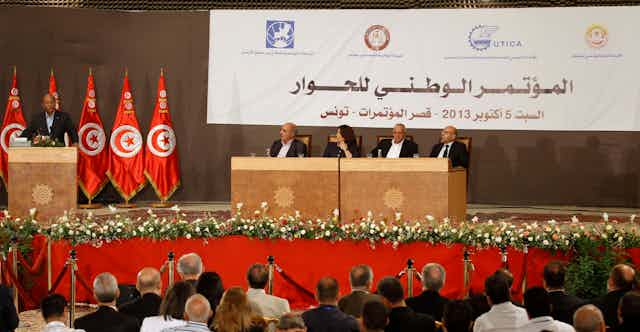The award of the prestigious Nobel Peace Prize to a collection of civil society organisations in Tunisia is welcome news all round. This isn’t just a good day for Tunisia and its fledgling democracy – it’s a potent recognition of the bravery of millions of citizens across the Arab world who took to the streets in 2011-2012, fighting for freedom, equality, social justice and human dignity.
This truly radical expression of people power has forever changed perceptions of authority and popular sovereignty across the region. At a time when authoritarian re-entrenchment and political violence is rife across the “Arab Spring” countries, this award sends a much needed signal of hope to all those seeking a more plural, accountable and peaceful politics in the region.
Deadlock broken
A cross-section of Tunisian civil society groups, the Tunisian National Dialogue Quartet played a significant role as a domestic mediator in the political crisis that engulfed the country in 2013 and that threatened to derail its transition to democracy.
The 2013 crisis was triggered by the growing polarisation of Tunisian politics, which were divided between an Islamist-led coalition government and its secular opponents. The two sides were deadlocked over the drafting of a new democratic constitution.
With the institutional process faltering, the quartet stepped in to mediate between the conflicting parties, proposing a detailed “political road map” out of the crisis and towards the completion of the transition process.
Among other things, this road map provided for the establishment of a technocratic government and set up a mechanism for the completion and ratification of the draft constitution.
Ultimately, of course, this proved successful. It led to the ratification of one of the region’s most progressive constitutions and the subsequent election of a new parliament and coalition government. Put simply, the quartet deserves credit for providing Tunisia’s political establishment with a viable route out of the crisis.
The road map’s success, of course, was not solely down to the diplomatic skills of the quartet. At minimum, it certainly had something to do with context and timing. As Owen Frazer has rightly pointed out, the triumph of pragmatism and compromise did not happen in a vacuum.
Impetus enough was provided by a spate of political assassinations of leftist politicians at home in early and mid-2013. Then, of course, there was the Egyptian armed forces’ coup against the short-lived Morsi government in June 2013.
For the moderate Islamist Ennhada party in particular, these developments seem to have played crucially into their decision calculus to participate in, and support, the national dialogue process and road map out of the constitutional crisis.
Finally, as significant as the 2013 developments are in Tunisia’s political history, they’re only small steps on the long and rocky road to a secure, established democracy. Indeed, the challenges for this fledgling democracy are still formidable, as the country seeks to normalise democratic politics amid a deep economic crisis and serious challenges to its domestic stability.
But that doesn’t mean the remarkable steps Tunisia has taken were for nothing – and it’s high time they were recognised.

